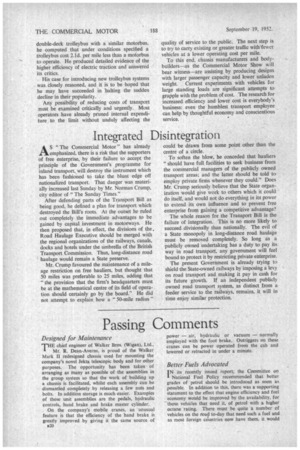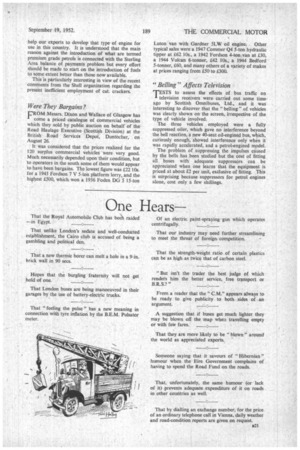Passing Comments
Page 54

Page 55

If you've noticed an error in this article please click here to report it so we can fix it.
Designed for Maintenance
THE chief engineer of Walker Bros. (Wigan), Ltd., Mr. R. Dean-Averns, is proud of the Walker Mark II redesigned chassis used for mounting the company's novel Jekta telescopic body and for other purposes. The opportunity has been taken of arranging as many as possible of the assemblies in the group system so that the work of building up a chassis is facilitated, whilst each assembly can be dismantled completely by releasing a few nuts and bolts. In addition storage is much easier. Examples of these unit assemblies are the pedals, hydraulic controls, hand brake and brake master cylinder.
On the company's mobile cranes, an unusual feature is that the efficiency of the hand brake is greatly improved by giving it the same source of 820 power — air, hydraulic or vacuum — normally employed with the foot brake. Outriggers on these cranes can be power operated from the cab and lowered or retracted in under a minute.
Better Fuels Advocated
IN its recently issued report, the Committee on 1 National Fuel Policy recommended that better grades of petrol should be introduce.d as soon as possible. In addition to this, there was a supporting statement to the effect that engine efficiency and fuel economy would be improved by the availability, for -those vehicles that need it, of petrol with a higher octane rating. There must be quite a number of vehicles on the road to-day that need such a fuel and as most foreign countries now have them, it would help our exports to develop that type of engine for use in this country. It is understood that the main reason against the introduction of what are termed premium grade petrols is connected with the Sterling Area balance of payments problem but every effort should be made to start on the introduction of fuels to some extent better than those now available.
This is particularly interesting in view of the recent comments from the Shell organization regarding the present inefficient employment of cat. crackers.
Were They Bargains?
FROM Messrs. Dixon and Wallace of Glasgow has come a priced catalogue of commercial vehicles which they sold by public auction on behalf of the Road Haulage Executive (Scottish Division) at the British Road Services Depot, Duntocher, on August 26.
It was considered that the prices realized for the 120 surplus commercial vehicles were very good. Much necessarily depended upon their condition, but to operators in the south some of them would appear to have been bargains. The lowest figure was £22 10s. for a 1943 Fordson 7 V 5-ton platform lorry, and the highest £500, which won a 1936 Foden DG 5 15-ton Luton van with Gardner 5LW oil engine. Other typical sales were a 1947 Commer Q4 5-ton hydraulic tipper at £62 10s., a 1942 Fordson 4-ton van at 00, a 1944 Vulcan 6-tonner, £42 10s., a 1944 Bedford 5-tormer, £60, and many others of a variety of makes at prices ranging from £50 to £300.
"Belling" Affects Television
TESTS to assess the effects of bus traffic on J. television receivers were carried out some time ago by Scottish Omnibuses, Ltd., and it was interesting to discover that the." belling" of vehicles was clearly shown on the screen, irrespective of the type of vehicle involved.
The three vehicles employed were a fully suppressed oiler, which gave no interference beyond the bell reaction, a new 40-seat oil-engined bus, which, curiously enough, showed interference only when it was rapidly accelerated, and a petrolpengined model.
The problem of suppressing the impulses caused by the bells has been studied but the cost of fitting all buses with adequate suppressors can be appreciated when one learns that the equipment is priced at about £2 per unit, exclusive of fitting. This is surprising because suppressors for petrol engines alone, cost only a few shillings.




































































































































































